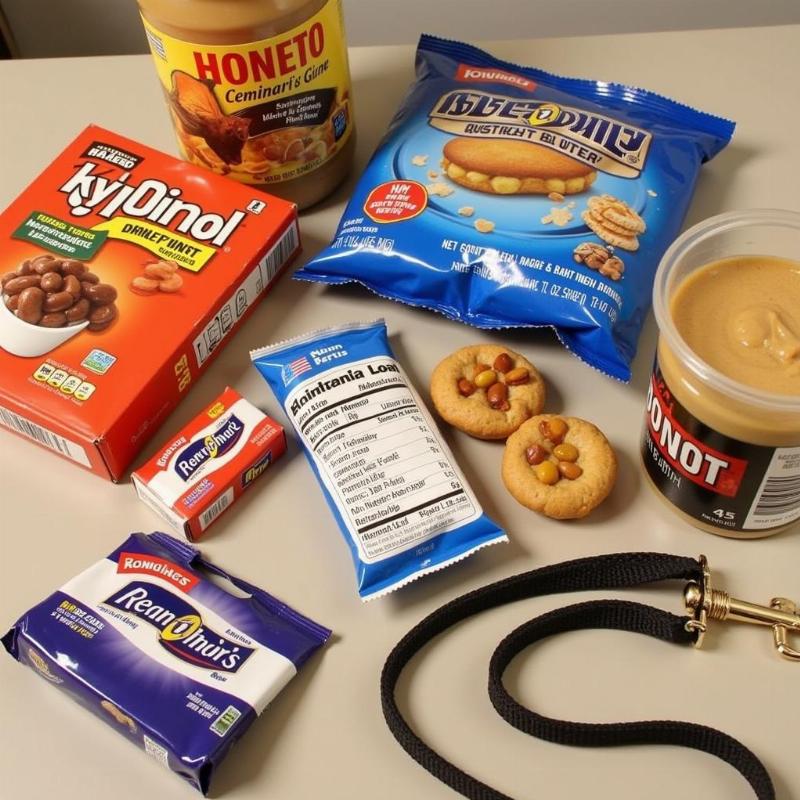Xylitol, a sugar substitute found in many sugar-free products, poses a serious threat to dogs. While it’s safe for humans, even small amounts of xylitol can cause life-threatening conditions in our canine companions. Understanding the dangers of xylitol and how to keep your dog safe is crucial for responsible pet ownership in the United States.
Why is Xylitol Dangerous for Dogs?
Unlike humans, xylitol causes a rapid release of insulin in dogs. This surge in insulin leads to hypoglycemia, or low blood sugar, which can manifest in symptoms such as weakness, vomiting, tremors, seizures, and even liver failure. The effects can be seen within 15-30 minutes of ingestion and can be long-lasting and severe.
 Various xylitol-containing products that are dangerous for dogs
Various xylitol-containing products that are dangerous for dogs
What Products Contain Xylitol?
Xylitol is hiding in plain sight in many common household items. It’s often found in sugar-free gum, candies, mints, peanut butter, baked goods, toothpaste, vitamins, and even some medications. Always check the ingredient list of any product before giving it to your dog, even if it seems harmless. The American Kennel Club (AKC) recommends keeping all xylitol-containing products out of reach of dogs.
Symptoms of Xylitol Poisoning in Dogs
Recognizing the symptoms of xylitol poisoning is vital for timely intervention. Early signs include:
- Vomiting: This is often the first and most noticeable symptom.
- Weakness/Lethargy: Your dog may seem unusually tired or uncoordinated.
- Tremors/Seizures: Muscle tremors and seizures can occur as blood sugar levels drop.
- Loss of Coordination: Difficulty walking or stumbling.
More severe symptoms, indicating potential liver failure, can develop later and include jaundice (yellowing of the gums and whites of the eyes), bleeding disorders, and coma.
What to Do if Your Dog Ingests Xylitol
If you suspect your dog has ingested xylitol, immediate action is crucial. Do not induce vomiting unless directed by a veterinarian. Contact your veterinarian or the ASPCA Animal Poison Control Center (APCC) immediately. They can provide specific instructions based on your dog’s weight and the amount of xylitol ingested. Time is of the essence in these situations, as prompt treatment significantly improves the prognosis.
Preventing Xylitol Poisoning
Prevention is the best approach. Keep all xylitol-containing products securely stored away from your dog’s reach. Educate family members, especially children, about the dangers of xylitol to dogs. When choosing treats and other dog products, carefully read labels to ensure they are xylitol-free. Opt for dog-specific toothpaste, as human toothpaste often contains xylitol.
Conclusion
Xylitol is a serious hidden danger for dogs in American households. By understanding the risks, recognizing symptoms, and taking preventative measures, we can protect our furry friends from this potentially deadly substance. Being informed and proactive is key to responsible dog ownership.
FAQ
- What is the toxic dose of xylitol for dogs? Even small amounts can be toxic. The toxic dose varies depending on the dog’s size, but it’s best to err on the side of caution and avoid any xylitol exposure.
- Can dogs recover from xylitol poisoning? With prompt and aggressive treatment, many dogs can recover. However, severe cases can lead to long-term health issues or even death.
- Are there any safe sugar substitutes for dogs? Erythritol is generally considered safe for dogs. However, always consult with your veterinarian before giving your dog any new food or supplement.
- What are the long-term effects of xylitol poisoning in dogs? Liver damage is a major concern. Some dogs may develop chronic liver disease even after recovering from the initial poisoning.
- Where can I find more information about xylitol and pet safety? The ASPCA Animal Poison Control Center (APCC) and the American Veterinary Medical Association (AVMA) are excellent resources.
- Is xylitol dangerous for other pets? While the focus is often on dogs, xylitol can also be toxic to other animals, such as ferrets.
- Are all sugar-free products toxic to dogs? No, not all sugar-free products contain xylitol. Always check the ingredient list carefully.
Beautdogs.us is your premier resource for all things dog-related in the United States. From breed information to expert grooming tips and product recommendations, we offer a comprehensive guide to dog ownership. Whether you’re a seasoned dog owner or just starting your journey, Beautdogs.us is here to support you every step of the way. Contact us for personalized guidance and the best resources for a happy and healthy dog. Email: [email protected], Phone: +1 501-555-7529.